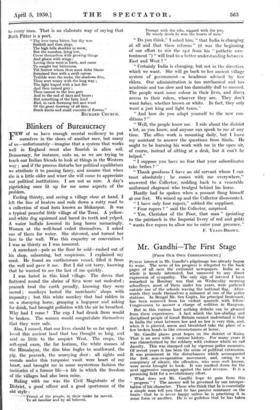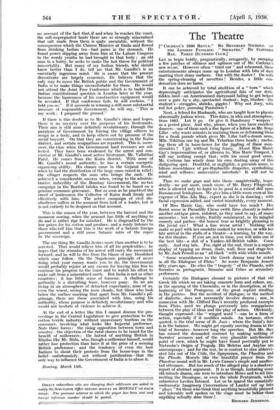Mr. Gandhi—The First Stage
[FROM OUR OWN CORRESPONDENT.] PUBLIC interest in Mr. Gandhi's pilgrimage has already begun to wane. The news of his progress is relegated to the back pages of all save the extremist newspapers. India as a whole is keenly interested, but unmoved to any direct expression of sympathy. The only sign of interest I have remarked in Bombay was that on Wednesday morning schoolboys, most of them under ten years, were gathered outside one of the schools waving the national flag. After- wards they made themselves a nuisance at one of the police stations. In Bengal Mr. Sen Gupta, his principal lieutenant, has been removed from his violent quarrels with fellow- Congressmen to answer a charge of sedition in Rangoon.
But in this curious land nothing definite can be gleaned from these experiences. A fact which the law-abiding and disciplined people of Great Britain cannot understand is that in India the crust between law and no law is very thin, and, when it is pierced, arson and bloodshed take the place of a few broken heads in like circumstances at home.
Mr. Gandhi places great hopes on the district of Kaira. That is an area with a curious history. For many years it was characterized by the robbery with violence which we call dacoity. This was stamped out by vigorous police measures. Of recent years it has been the scene of political extremism. It was prominent in the disturbances which accompanied the first non-co-operation movement, and, owing to a conspiracy of silence, the offenders, who were well known, were never brought to book. It was marked down for the next aggressive campaign against the land revenue. It is a promising field for a revolutionary effort.
What does not Mr. Gandhi hope to in from this " progress " ? The answer will be governed by our interpre- tation of his character. Those who think that he is essentially a simple man tell you that he has passive resistance on the brain—that he is never happy unless he is practising it in some form or another. He is so guileless that he has taken
no account of the fact that, if and when he reaches the coast, the salt-impregnated lands there are so strongly mineralized that salt made from them is quite uneatable, without the consequences which the Chinese Minister at Simla said flowed from drinking Indian tea—bad pains in the stomach. He found power slipping away from him at the Lahore Congress to the wordy youths he had brought to that body ; an old man in a hurry, he seeks to make the last throw for political immortality.. But many . of my Indian friends, who should know better than -I do, tell me that Mr. Gandhi's is an essentially ingenious mind. - He is aware that the present discontents are largely economic. He believes that the only way to move the British public and the Government of India is to make things uncomfortable for them. He would not attend the Joint Free Conference which is to tackle the Indian constitutional question in London later in the year, because the barrenness of his constructive equipment would be revealed. If that conference fails, he will exclaim, " I told you so." If it succeeds in winning a still more substantial measure of responsible Government, he will say, " This is my work ; I prepared the ground."
If there is this doubt as to Mr. Gandhi's ideas and hopes, there is no mystery over the purposes of his lieutenants. Their aim is still more definitely revolutionary, through the paralysis of Government by forcing the village officers to resign in a body, and to keep others out by pressure of the social boycott. On that they are concentrating in the Kaira district, and certain resignations are reported. This is, more-' over, the time when the Government land revenues are col-. lected. They have been weakened by the arrest and con- viction of Mr. Gandhi's most active lieutenant, Mr. Vallabhai Patel. He comes from the Kaira district. With none of Mr. Gandhi's moral authority, he has a certain energetic organizing ability. His chance came in the Gujarat floods, when he had the distribution of the large sums raised in relief ; the villager respects the man who brings the cash. Ile achieved a considerable success when, owing to the adminis-. trative imbecility of the Bombay Government, the no-tax, campaign in the Bardoli taluka was found to be based on a genuine economic grievance. But as soon as he practised the creed of lawlessness the Collector of Kaira dealt firmly and effectively with him. The active campaign of civil dis- obedience suffers at the moment from lack of a leader, but it is not entirely to be despised on that account.
This is the season of the year, between the harvest and the monsoon sowing, when the peasant has little of anything to do and is rather ripe for mischief. He is disgruntled by the low prices for his cotton and produce, and a ready, listener to those who tell him that this is the work of a Satanic foreign government and a still more Satanic ratio of the rupee to the sovereign.
The one thing Mr. Gandhi desires more than another is to he arrested. That would relieve him of all his perplexities; he hopes that the stimulus of his arrest will carry the movement forward, and he will be free from the blame of any bloodshed which may follow. On the Napoleonic principle of never doing what • your -enemy wants you to do, the Government would probably rejoice at any excuse for leaving him free to continue his progress to the coast and to watch his effort to make salt from a mineralized earth. But India is not as other countries ; it has little sense of humour. A challenge to authority is a disturbing force, however puny. So we are living in an atmosphere of detached expectancy, none of us, even the wisest, seeing the issue clearly, but those who look below the surface marking that apart from Mr. Gandhi's pil- grimage, there are those associated with him, using his authority, whose purpose is definitely revolutionary and who would not hesitate at violence to achieve it.
At the end of a letter like this I cannot discuss the pro- ceedings in the Central Legislature to give protection to the cotton textile industry without unnecessary burdens on the consumer, involving what looks like Imperial preference. Note three forces : the rising opposition between town and country—the objection of the rural classes to be taxed for the benefit of millowners ; the hatred of anything British in Hindus like Mr. Birla, who, though a millowner himself, would rather lose protection than have it at the price of a seeming British preference ; and the tendency of even the best Indians to shout their protests from the house-tops in the belief—unfortunately, not without justification—that the only way to influence the Government of India is to abuse it.
Bombay, March 15111.











































 Previous page
Previous page